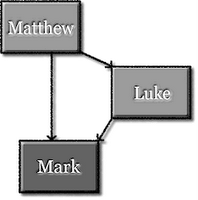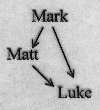 Jeff the Baptist has uncovered a dirty little secret in New Testament studies regarding the Q source hypothesis for the Synoptic gospels:
Jeff the Baptist has uncovered a dirty little secret in New Testament studies regarding the Q source hypothesis for the Synoptic gospels:This is the theory I have heard most of my life. Not that I cared much because I'm far more interested in what the Gospels say rather than how they got that way. Personally, I think two-source hypothesis is so popular because it is useful to academcis. If Q existed, it certainly doesn't exist anymore. There are no known copies of it anywhere. Therefore the academics can pontificate about Q's contents for a very long time. Hopefully lots of grant money is involved in this pontification and subsequent publication.
I am shocked that anyone would suggest that theologians or Biblical scholars could be motivated by fame and grant money. Anyway, I lean toward the Two Source Hypothesis, one of them being Q. But I'm just a first-year seminary student.

One alternative is the Griesbach Hypothesis, which places Matthew as the first gospel:

But Jeff prefers the Farrer Hypothesis, which states that Mark was first, and that there was no Q:

To what hypothesis of Synoptic sourcing to you subscribe?

12 comments:
I suspect that were we ever to discover how we ended up with the gospels we've got, the answer would turn out to much more complex that any of these simple hypotheses (all of which have holes in them). There may well have been a collection of sayings that amounts to something like the hypothetical "Q" that you mentioned, but I'm a long way from convinced that there is any mileage in attempting to retrieve it.
I'm not strongly endorsing any viewpoint. I don't like the complete conjecture that is Q, but I don't mind Markan priority. That makes the Farrer hypothesis attractive. But I haven't sat down and really studied the differences in the texts to inform myself yet.
Personally, I am an advocate of the Q Continuum hypothesis as shown in the initial photo.
I thought Jesus wrote the Bible?
;)
I heard that it was Constantine.
"I heard that it was Constantine."
Dude, there is no way that that guy from American Idol wrote the Bible. He's like only 30. It has to be a lot older than him. Like 20 years older at least. Duh! As if!
Amusing one and all, but if I can ask a serious question, why doesn't anyone seriously assume that the fabled Q is just oral tradition? We're talking about a highly oral society. Why is Q not just assumed to be oral until proven otherwise?
We're talking about a highly oral society. Why is Q not just assumed to be oral until proven otherwise?
The consensus is that the parallels are too precise and extensive to be purely oral.
Having said that, I'm not with the consensus in that I prefer the Griesbach hypothesis. It still has weaknesses, but in my view the 2 source hypthesis depends heavily on Matthew and Luke being completely independent of one another and I don't find that extremely probable.
I tend to agree with Jeff in that no "Q" document actually existed. There may have been a verbal history passed around (which was common in that time) but to imagine that there was a gospel outline is a rather holistic approach to determining the origin. One would imagine that God, in His wisdom, would not allow such an outline to lost of it existed.
As Adam Hamilton frequently points out, Luke begins his gospel "Inasmuch as many have undertaken to compile a narrative of the things that have been accomplished among us, just as those who from the beginning were eyewitnesses and ministers of the word have delivered them to us ..."
Luke appears to credit both written compilations and oral traditions linked to the apostles. More than that, I cannot say. Matthew, Mark, Luke and John are our canonical gospels. Their narratives "got it right".
It might be helpful to know the sequence of the canonicals in order to do redaction criticism. I think redaction critical approach still has some value based on observed differences without necessarily implying sequence. Still, you can't be always impute purpose to differences in wording.
Form criticism, the attempts to recreate the independent, pre-canonical nuggets of the gospel tradition, is pretty useless as far as I'm concerned.
I may be in a minority in that the study of the two-source theory is partly responsible for my being a Christian today. I was in a spiritual funk in high school and a friend invited to his church youth group. It was pretty typical youth group fare except in what they happened to be studying at their Wednesday night Bible study: the two-source theory of the synoptic gospels. I was fascinated, and I was hooked.
I have always felt that Q did exist in some form or another, as we see similar parallels in apocryphal Gospels such as Thomas as well as in Matthew and Luke. The argument for this "list of sayings of Christ" seems quite probable due to the similarities of Matthew and Luke. Things such as the "Sermon on the Mount/Plain" could have been a conglomeration of these sayings and fashioned by the authors into one event.
Needless to say, the Q source could be plural sources and thus, an expectation of something like Q popping out of the woodwork to archealogists in the near future is a little premature.
happily agnostic about it at this point. it's an interesting question, but being a canonical kind of guy, I receive the gospels in the forms we have in the NT. Q seems plausable, as other theories do to, so I don't have a dog in that fight.
Post a Comment